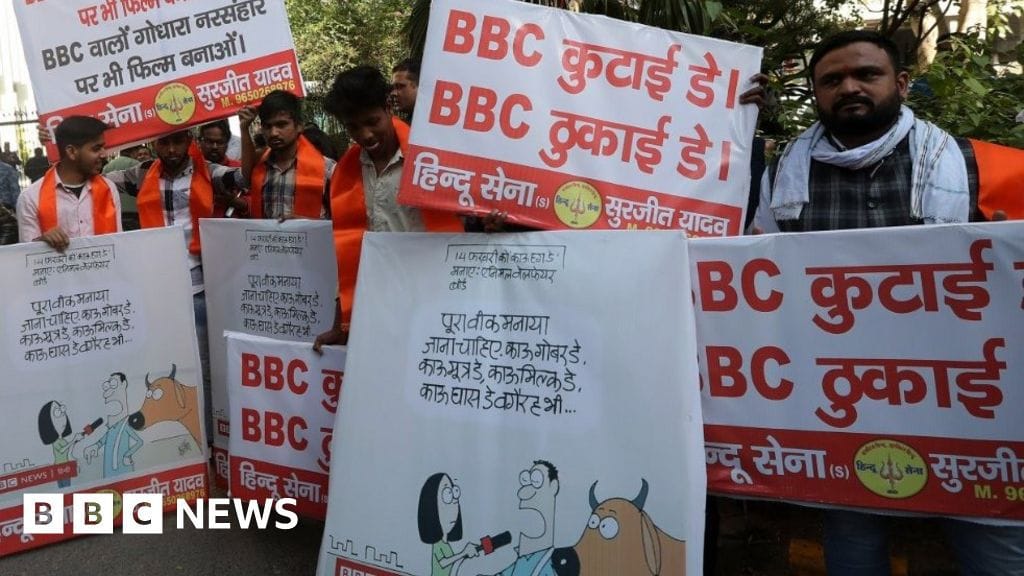India’s BBC ‘Survey’ Fiasco Exposes Our Hypocrisy Toward Press Freedom

By Sean Young, MA International Studies and Diplomacy
Last month, the Mumbai and New Delhi offices of the BBC were ‘surveyed’ by income tax department officials, just weeks after the release of a documentary critical of prime minister Narendra Modi, which the government later blocked. Though the officials called the procedure ‘routine’, many in India think otherwise.
In a statement, Dhanya Rajendran, editor-in-chief for TheNewsMinute and Abhinandan Sekhri, CEO of Newslaundry, noted that the ‘surveys’ not only tarnish India’s global image as a mature democracy but also ‘impair relations’ with other democracies.
In a tweet, columnist Swati Chaturvedi, known for her scathing criticism of the central government, questioned the relationship between tax evasion and the seizing of journalists’ phones. ‘A journalist would go to jail to protect a source taking the BBC journalists’ phones in the Delhi raid is the Modi government trying to intimidate the free press. What do journalists’ data have to do with tax evasion?’ she wrote.
However, this is not a lone incident. It has now become a precedent—a dangerous one, to say the least. In 2021, media anisations such as Scroll, Newslaundry, and the Dainik Bhaskar were surveyed by the IT Department.
“A journalist would go to jail to protect a source taking the BBC journalists’ phones in the Delhi raid is the Modi government trying to intimidate the free press. What do journalists’ data have to do with tax evasion?”
According to Human Rights Watch’s report in 2022, Indian authorities are increasingly targeting journalists and online critics for their criticism of government policies and practices. There have been instances of prosecuting them under counterterrorism and sedition laws.
However, this is not the case I want to discuss here. There is enough literature out there to describe in detail the current state of journalism in India, but what must be highlighted is the hypocrisy that involves Western personalities and media; the Indian media and it is becoming far too obvious now.
When the Indians are lauded by Western media outlets like The New York Times and The Washington Post, it is a sense of ‘celebration’ and shows the craving for validation of the West. However, critical views from the same Western media outlets and think tanks are seen as ‘attacks on India’ by the government.
Did we forget that we are no longer under emergency rule? Why do we have to take everything the West says about us to heart? We say the Western media is biased—yes, they are, but whining about it is not going to do much! There comes a time to stop whining and take things with a grain of salt.
Recently, India’s Ministry of External Affairs spokesperson, Arindam Bagchi, responded to the release of the BBC documentary, saying that it ‘is a propaganda piece designed to push a particular discredited narrative’ and added that ‘the bias, the lack of objectivity and frankly, a continuing colonial mindset is blatantly visible.’
Coming to the documentary–the events are well documented in Indian media, there cannot be any denial of what transpired during that period. While the documentary tried its best to remain objective, bias is prevalent. Interestingly, the buck doesn’t just stop at the BBC documentary; it extends to the Hindenburg report on the Adani group and George Soros’ remark on the Adani scandal weakening the current government.
Renowned Indian author Siddharth Bhatia, recently in his piece for The Wire, summed it up perfectly. ‘Seven and a half decades after independence, we are still so insecure that a documentary or an analysis of a private company can shake the foundations of this nation,’ he wrote, and quite frankly, one couldn’t agree any more.
When then-presidential candidate Joe Biden picked an Indian-American senator from California, Kamala Harris, as his running-mate during the 2020 U.S. Presidential election, it was an occasion of utmost celebration, and the same emotions were felt when Rishi Sunak became Prime Minister of the United Kingdom. We celebrated when Indian students and persons of Indian origin dominate scholastic competitions like the ‘Spelling Bee’ in the U.S. In spite of this, why is there a need for the approval of the West?
We have accomplished so much in the last 75 years, and more importantly, India has a much more important role to play, especially with the G20 Presidency. India has also been seen as a crucial actor in the Ukraine war. So you see, the work is cut out already. But rather than focusing on that, we are more interested in what some random white dude, or some private company or media outlet says about us.
The BBC tax survey fiasco exposes our hypocrisy. We jump at the praise of the West, but winge and whine when a foreigner criticises. I understand, there are colonial roots here, but fun fact: we are no longer under colonial rule anymore, and we certainly do not need the West to tell us how good we are. So the best way to start the process of decolonisation, stop giving airwaves to the West’s opinion of us!
Photo Caption: Activists demonstrated against the BBC in Delhi (Credit: BBC).



